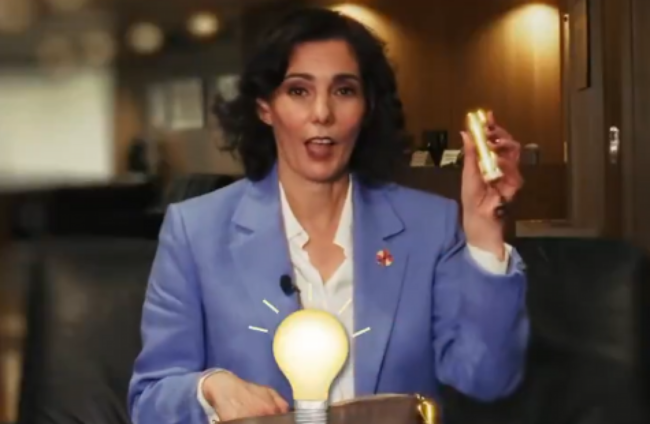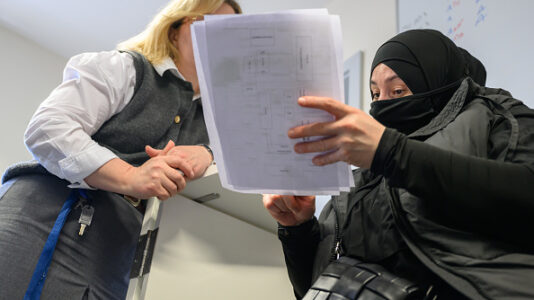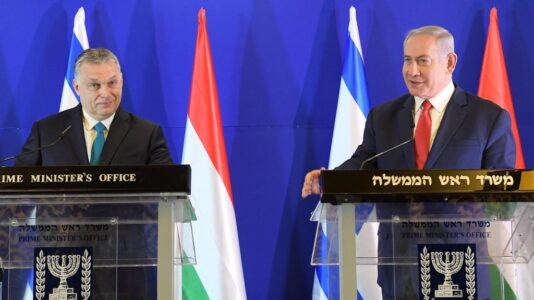The European Commission publicized a set of 30 recommendations last week that it says all the European Union’s member states should adopt in order to prepare for “future crises.” The centerpiece of this plan is the idea that all EU citizens should prepare a personal “survival kit” that would allegedly keep them alive for 72 hours in the event of any disaster.
The survival kit was highlighted in a bizarre video published on the Commission’s official YouTube channel featuring European Commissioner for Humanitarian Aid and Crisis Management Hadja Lahbib.
In it, Lahbib takes items out of what looks like a lady’s handbag in order to sarcastically present the kit’s suggested contents – including food, water, cash, eyeglasses, a flashlight, a lighter, a phone charger and power bank, one’s identity documents in a waterproof pouch, a deck of cards, and a Swiss Army knife, among other items – to an unseen audience that dutifully laughs on cue as the commissioner makes clumsy attempts to make light of the situation. The video resembles an amateur stand-up comedy routine more than advice for surviving the apocalypse.
No specific threat was offered as a rationale for why the Commission has decided to offer such advice at the present time. It is likely not unrelated to the fact that, given the rhetoric coming from the Trump administration, the EU is currently facing the prospect of having to defend itself from external threats without American assistance for the first time in its history. This is all the more so given that several European leaders have made it clear that they intend to continue to support Ukraine’s struggle against Russia at all costs, with or without Washington at their side.
Hungarian Foreign Minister Péter Szijjártó was unimpressed by Brussels’ initiative, however, saying that he was uncertain at first if the commissioner’s video was intended as a joke. In a video published on his Facebook wall, he condemned the “survival kit” video as yet another indication of how the EU has lost its “seriousness, competitiveness, place, and importance” in global politics.
“At first we thought it was some kind of trolling or a joke,” the minister said. “Why in the 21st century are EU residents suddenly being advised to pack a survival kit? If we try to find an explanation, then unfortunately, there is only one: Brussels is preparing for war.”
The survival kit recommendation is only one point in the Commission’s Preparedness Union Strategy that was revealed last Wednesday, however. The strategy also recommends that there should be greater cooperation between the civilian and military authorities in the event of a crisis, and also calls for the stockpiling of essential equipment and supplies, including medicines and vaccines, energy resources, and raw materials that are necessary for industrial production.
It remains unclear how much of this stockpiling would be carried out at the EU level and how much at the national level, with one anonymous official admitting to Euronews that “that’s a discussion we need to have.”
Speaking to reporters, European Commissioner Roxana Mînzatu cited the COVID-19 pandemic as justification for the new plan, a crisis which she claims showed that “acting together in solidarity, in coordination, in the European Union framework is absolutely crucial.”
The desire to increase cooperation between the civilian authorities and the military was also explained as a response to alleged acts of sabotage against underwater cables in the Baltic Sea, which some EU officials have blamed – without evidence – on Russia.
Péter Szijjártó criticized the new initiative from Brussels on the grounds that the EU is not currently being faced with the threat of war, either collectively or in part. He maintained that the actual risk of escalating the conflict with Russia stems from the EU’s own pro-war policies.
As for the Commission’s strategy itself, Szijjártó condemned it as a form of “astonishing and baseless hysteria that is devoid of any element of common sense.” He attributed the timing of the Commission’s announcement to the fact that it is frustrated at being sidelined in the ongoing peace negotiations being brokered by the United States and Russia – primarily because they recognize that it is indeed the case that only an agreement between these two powers can end the war.
Szijjártó explained that the Brussels elite wants to prolong the war for as long as possible because otherwise they will have to go before the European peoples and explain why they continually pursued a policy of expanding the war for more than three years that ultimately failed, despite having caused very real harm to the lives of all the blocs’ citizens in the forms of inflation and the depletion of military stockpiles.
European politicians would also have to tell their constituents where all the hundreds of billions of euros that the EU has sent to Ukraine have gone and what has been done with the money, the minister said, even as Kyiv insists that it can no longer maintain its military or even the state’s everyday operations.
Szijjártó added that the real place of EU politicians should be to support US President Donald Trump in his efforts to reach a peace agreement. “We should not undermine the path to peace negotiations, but support them,” he asserted.
The minister concluded by saying that Hungary, in accordance with the will of a majority of its citizens, will continue to block Ukraine’s accession to the EU, despite the wishes of the Brussels elite, given that this would lead to extreme danger for the bloc both financially and in terms of security. He reminded his viewers that the Hungarian people will be able to express their views on Ukraine’s EU membership in a referendum that will be held next month.
As for the Commission’s proposed strategy, its officials have promised that a new EU “crisis coordination hub” is being formed that will issue its first “threat assessment” at the end of 2026. When asked why it would take nearly two years to make the assessment, one official explained that the process will be “complex” due to the number of member states involved.






